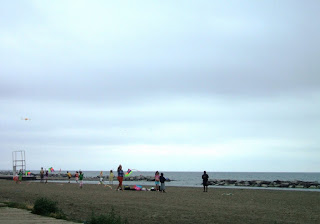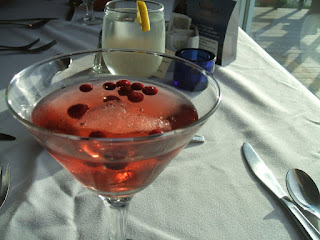
Well, how the time whips by! Last addition to this blog was the middle of July, and I was just off to West Haven Camp, to be a camp director/chaplain - a first! I’ve also taken on

the role of Vice-Chair of the camp board, so it seemed appropriate to take at least a week. And what a week! 35 children between 7 and 10 years old - and of course the accompanying homesickness from some. Every day began with the raising of the Canadian flag, except for Newfie day - when the Newfoundland flag is raised. One little fellow caused many problems; in the end we realised he also was homesick - it was his first time at camp and away from home. We got him through the week, and although it was difficult at some points for the counsellors, it was really important to work with him. That’s what camp is about. He made it through the week, and when I saw the huge grin on his face Friday morning, and his comment “I MADE IT!!!”, camp was definitely worth it.
So - among other things the kids learned to sing an African welcome song “Mulumele Shangwe”, and made bird feeders to put on trees around the camp. They were quite taken with not only the birds but the chipmunks who came up to get the bird seed.
At the end of July, I hopped on a plane and flew to Toronto. Ack!!!!! Hot, humid, and chock full of traffic going nowhere. My poor little lungs, which by now are used to clean Corner Brook air, really didn’t know quite what to do. Gasping, it was time to whip out the antihistamines again. I miss the people, but sure don’t miss Toronto.

In the week, I did manage to see friends from Glen Ayr, a friend recovering fro

m surgery, and another friend just going for surgery. Plus a walk along the boardwalk, and a wonderful breakfast, with a cruise friend who visited Corner Brook earlier....and of course my wonderful kids and grandkids....and discovered that there is a labyrinth made of stones down on the beach at the boardwalk.....
Norio came back from Japan, and on the 5th of August we were on the road to Newfoundland. It was a nice comfortable drive, and we anticipated a couple of days camping in PEI. Well, we did pitch the tent, but since the rain never let up, we spent most of our time poking around in Charlottetown, Montague, and at the Panmure Island Lighthouse. NO sun at all. View of Panmure I

sland Beach from the lighthouse - and a shot of the working light.

Back here, there was a week rest and do some work, and some hiking up in the tablelands in Gros Morne. The picture at the top is from that hike. On the 17th we were off to Halifax for the Japan Studies Association of Canada annual conference. Halifax is one of the nicest cities in Canada, and gets better all the time. We ate lots of seafood, sampled beer at a loca

l brewery, sailed on a tall ship “Mar II”, got a wild show from a tugboat, saw Theodore Tugboat of course; and of course, heard papers. I went specifically to hear a paper about the Presbyterian and United Church missioners who “accommodated” the Japanese occupying forces during World War II in Korea, to the detriment of Korean Christians. There was also a comprehensive update from the Consul General of Japan in Montreal regarding the ongoing crisis, and a keynote address on the nature of patriotism and terrorism, particularly in Japan. Lots of good info and some sermon material. The new ferries - Blue Puttees and Highlanders - are much bigger, and even have a helipad on Deck 10....thought you'd like to know that :-)


Back in Corner Brook for a wedding on the 23rd, and then off again to L’Anse aux Meadows to see icebergs. Stayed in a beautiful B&B, and of *course*, at our very first breakfast a couple looked up and said “Hey. You’re Rev. Fran aren’t you!” On the second morning, Norio and the young man across the table realised they have offices on the same floor at York University.
....we also met a young woman from Melbourne in Australia - travelling through Newfoundland and Labrador, and were able to connect her to a minister in Labrador. Hope she stops here in Corner Brook on the way back down. And met an fascinating man from Florida who was motorbiking (his wife doesn’t like the bike) - he’s from Germany and has two businesses of his own. That’s really half the fun of a B&B, the people you meet.
Our host at the B&B is a member of the United Church, as is one of her friends who makes the most gorgeous quilts. She had just been out picking the wonderful bakeapple berries, and was happy to sell four quarts freshly picked. It’s berry season!!!!
...and then there were the icebergs. I tend to gush when I get talking about them. We did a two-hour boat trip out on the ocean. Didn’t see any whales but the big bergs more than made up for any of that. Didn’t get tired taking pictures of them either. Morning started out overcast, and the bergs somehow had a pale mauve overcast along with blue and white. As the day went on the sun came out and the pictures got even better. We drove to St. Anthony Bight ( a small cove with a beach and picnic tables) and the whole place was jammed with icebergs. So was St. Carol’s. A local character told us the smaller pieces are called “berg-er bits”. Some of those “bits” are now in the freezer!!!! Imagine drinking something 15,000 years old!
On the return trip we saw two moose, and stopped to look at the wreck of the SS Ethie, which broke up on the shores of Gros Morne in a huge storm - back in the ‘30's. She was a steam/sailing ship which carried people goods and mail up and down the coast. All 94 passengers were safely taken off and no one died, but the wreckage remains. Fascinating.
Norio has returned to Toronto - he did the whole trip including ferry, in 48 hours. I got just a tad snarly because he went almost the whole two days without being in contact - just ate, slept and drove. But at least he is home OK. The house is quiet, and almost back to clean. I have a paper to read, and some schedule planning to do for the fall, and start on service prep.
Update: I went back and read some of the Ruminations on the Road. Those will be posted shortly as well. Also, hope you like pics of icebergs, ‘cause there are a lot.





















